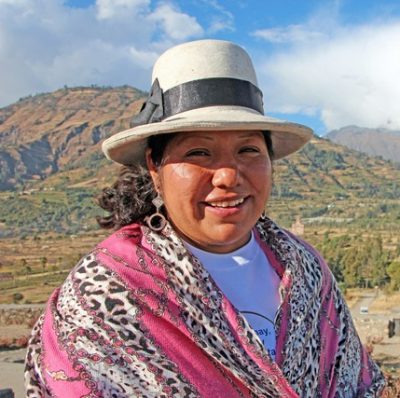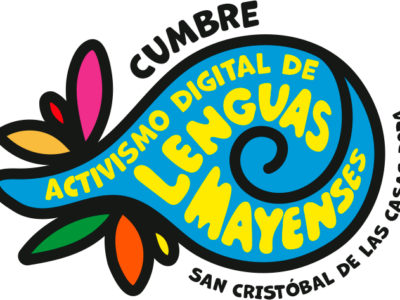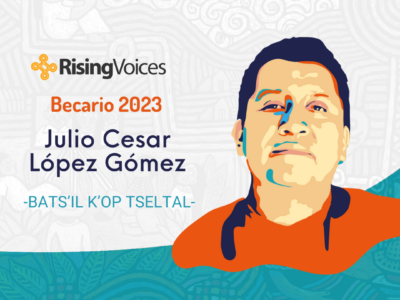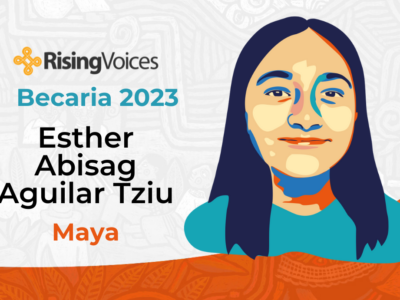
Photo provided by Margot Camones Maguiña
In 2019, we are inviting several hosts to manage the @ActLenguas (Language Activism) Twitter account and to share their experiences in the revitalization and promotion of their native languages. This profile post is about Margot Camones Maguiña(@MargotCamones) and what she plans to discuss during her week as hostess.
Rising Voices (RV): Please tell us about yourself.
Soy Margot Camones Maguiña, natural del caserío de Huacna, del distrito de la Merced, de la provincia de Aija, región Ancash, tengo 37 años de edad, docente de profesión, actualmente laboro en el Ministerio de Educación, como Especialista Nacional de Educación Intercultural Bilingüe, paralelo a esta actividad dedico una partesita de mi tiempo a las redes sociales, a los medios digitales y otros, para motivar el uso del quechua en los diferentes sectores, algunas veces con frases amorosas, que obtiene una interacción impresionante con los usuarios de Facebook o twiter.
Otra con palabras sueltas que también ayudan a la investigación de parte de los lectores, algunas veces videos, escribo también artículos y los publico por diferentes medios, tengo por ejemplo dos canales de YouTube (canal 1, canal 2), donde difundimos videos relacionadas al quechua como también a la actividades culturales, tengo un blog allí estoy compartiendo enlaces para mantener en vigencia digital el quechua, del mismo modo hago una serie de actividades sociales para seguir difundiendo la importancia del quechua en todo espacio público como un derecho de todos.
Algunos enlaces para compartir:
My name is Margot Camones Maguiña, I am from the Huacna village, in the district of La Merced, from the province of Aija, in the Ancash region in Peru. I am 37 years old, I am a teacher, and I currently work in the Ministry of Education as National Specialist of Intercultural Bilingual Education. I am also active in promoting the use of the Quechua language in social media, and digital media in different sectors, sometimes with expressions of affection, which get an impressive amount of interaction from the Facebook and Twitter users.
As each word and video helps readers learn more about the language, I also write articles and publish them through different media: I have two YouTube channels (channel 1, channel 2), where we broadcast videos related to the Quechua language and of different cultural activities. I also have a blog where I share links to promote the Quechua language in the digital space; and I do a series of social activities to continue spreading the importance of Quechua in all public spaces as a right of all.
Some relevant links:
RV: What is the current status of your language on the internet and offline?
Actualmente el quechua tiene una importante cantidad de hablantes según los censos del INEI, sin embargo hace mucha falta la conciencia de practicarlo en público, de hablar sin vergüenza, hay resistencia para salir de la casa y bailar en la calle al compás de su vestimenta (quiero decir que la lengua sigue siendo en muchos casos lengua de hogar, y se mantiene allí), por ello he encontrado como medio poderoso de volver a la gente a sus raíces atreves de los medios digitales disponibles.
Somos pocas personas las que asumimos esta tarea de difundir nuestra lengua por la internet, ya que ésta es un trabajo extra y voluntario, sin embargo nos hace falta conocer el manejo adecuado de los medios para empoderarnos y seguir introduciendo el uso en todos los medios posibles.
Hacen falta políticas lingüísticas claras de los gobiernos de turno, por ello queda la tarea pendiente de seguir concientizando, aunque de un tiempo a esta, se conformó el Organización Regional de Pueblos Quechuas de Ancash, que está logrando generar interesantes políticas en el gobierno regional y algunos gobiernos locales.
Currently, according to INEI (National Institute of Statistics and Informatics) censuses, there is a significant number of Quechua speakers; however, there is a lack of awareness and a resistance to proudly speak it in public, and the language is still, in many cases, only used at home. This is why I have realized that the available digital media is a powerful means of returning people to their roots.
There are few of us who take this task of spreading our language through the internet, since this is an extra and voluntary work; however, we need to know the proper management of the media to empower us and continue introducing its use in all possible ways.
There is a need for clear linguistic policies from the current government. This is why, in order to continue raising awareness, although for some time now, the Regional Organization of Quechua Peoples of Ancash was founded, which establishes interesting policies in the regional government and some local governments.
RV: On what topics do you plan to focus during the week that you’ll manage the @ActLenguas Twitter account?
Los temas que abordaré son videos promocionales sobre el quechua a través del YouTube donde recoja testimonios de personajes ilustres que hablen la lengua, para motivar a otros su uso, teniendo en cuenta los siguientes aspectos.
- Textos reflexivos en video y pequeños testimonios sobre la importancia de difundir, hablar, preservar y fomentar el uso del quechua.
- Fomento de políticas lingüísticas de parte de las autoridades (video)
- Testimonio de personas hablantes nativos del quechua dando testimonio del porque les da vergüenza hablar el quechua.
- Memes humorísticos difundiendo derechos lingüísticos.
- Artículos sobre la importancia de fomentar activismo digital de mi lengua.
The topics that I will address are promotional videos about Quechua through YouTube where I collect testimonies of well-known people who speak the language, to motivate others to use it, taking into account the following aspects:
- Reflective texts on video and small testimonies on the importance of spreading, speaking, preserving, and promoting the use of Quechua.
- Promotion of language policies by the authorities (video)
- Native Quechua speakers’ testimonies of why they are ashamed to speak Quechua.
- Humorous memes disseminating linguistic rights.
- Articles on the importance of promoting digital activism of my language.
RV: What are the main motivations for your digital activism for your language? What are your hopes and dreams for your language?
Mi mayor motivación es el amor al quechua y todas las lenguas existentes porque considero que son ejercicio ciudadano, son patrimonio y sobre todo es una forma de vida que asumo como encargo social de mi gente, mi pueblo, mis padres y abuelos.
Sueño que mi lengua este empoderado en todo espacio, que los medios digitales sean nuestros aliados, que hayan muchísimas personas difundiendo su lengua por cualquier medio, que los problemas sociales que hoy nos aquejan sean abordados desde la perspectiva de la cultura y la lengua.
Sueño que en los colegios no haya justificaciones para enseñar el quechua, que las autoridades sean realmente quechuas y otorguen recursos para fomentar investigaciones en lenguas originarias y que haya algún presupuesto para que las instituciones públicas tengan información en páginas web u otros medios sobre la atención a la lengua.
My main motivation is my love of Quechua and all the existing languages because I believe that they are a citizen's rights, they are part of heritage, and, above all, it is a way of life that I consider as being the social responsibility of my people, my village, my parents, and grandparents.
I dream that my language will be empowered in every space, that digital media will be our allies, that there will be many people spreading their language through all media, that the social problems that affect us today will be addressed from the perspective of culture and language.
I dream that there will be no justifications for not teaching Quechua in schools, that there will be Quechua officials, and that they will provide resources to encourage research in native languages, and that there will be a budget for public institutions to have information about native languages on websites and other media.



